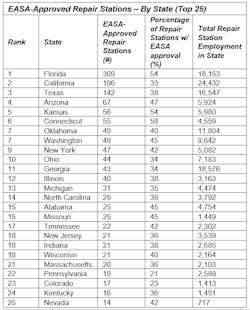ARSA Study Finds U.S. Companies Serving Global Aviation Customers
WASHINGTON – The U.S. maintenance sector is increasing its capability to serve the growing, global aviation industry. Seventy-three more Federal Aviation Administration (FAA)-certificated repair stations in the United States are approved by regulators to serve European customers than were at this time last year and the total number now exceeds 1,500, a new analysis by the Aeronautical Repair Station Association (ARSA) shows.
ARSA found Florida, California and Texas holding firm at the top of the list as the states with the most maintenance companies approved to work on European-registered aircraft, engines, propellers and components. Arizona, Kansas, Connecticut, Oklahoma, Washington, New York and Ohio complete the top ten.ARSA analyzed the list of FAA-certificated repair stations in the United States authorized by the European Aviation Safety Agency (EASA) to work on European-registered aviation products and articles. The association then correlated the data with industry employment figures developed by Oliver Wyman CAVOK. ARSA first conducted such an analysis of EASA approval holders in 2017 and continues renewing it annually.
Under international law, the state of an aircraft’s registry controls its maintenance. In order to work aviation products and articles registered to operate by a foreign civil aviation authority, a U.S. facility must be approved by that jurisdiction. A bilateral aviation safety agreement between the United States and European Union makes it easier and more efficient for U.S. facilities to obtain the necessary approval from EASA.
ARSA determined there are 1,507 repair stations with EASA approval across 47 of the 50 states, up from 1,437 last year. Overall, roughly one out of every three U.S. repair stations holds European certification. There are four states – including Connecticut, Florida and Kansas – in which 50 percent or more of maintenance facilities can perform work on European-registered aircraft or components. West Virginia, the fourth state, has a smaller aircraft maintenance industry but the highest percentage (72 percent) of EASA approval holders.
The increase in the number of U.S. EASA approval holders from last year comes despite the recent partial U.S. government shutdown. Given that FAA personnel play a central role in EASA certificates held under the bilateral agreement – it is possible for a repair station to apply for European as a “third country,” outside of the BASA’s scope – many ARSA members complained that the shutdown caused delays in the approval and reapproval process.
Nationwide, repair stations employ more than 188,700 workers. When those numbers are added to the roughly 30,300 mechanics working for airlines and the 69,200 employed in aviation parts manufacturing and distribution, the maintenance industry’s total workforce is approximately 288,200. More than 108,300 Americans are employed at maintenance companies in the top 10 states for EASA approvals.
“The data underscore the commitment of U.S. maintenance companies to expand their capabilities to serve a global customer base,” ARSA Executive Vice President Christian Klein said. “The increase in EASA approvals in the United States reflects the rising global demand for aviation maintenance services. Given their high level of technical proficiency, U.S. repair stations are well-positioned to capitalize on that demand.”
“The study underscores both the global nature of the aviation maintenance industry and how U.S. industry benefits from reducing regulatory inefficiencies across borders,” Klein said. “Increased cooperation and mutual recognition between regulators are critical to maintaining the positive trends.”
To review the ARSA-generated data, click here to download the excel file.
